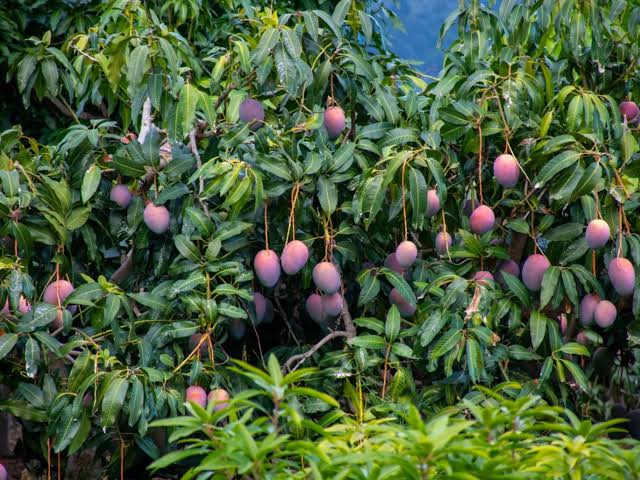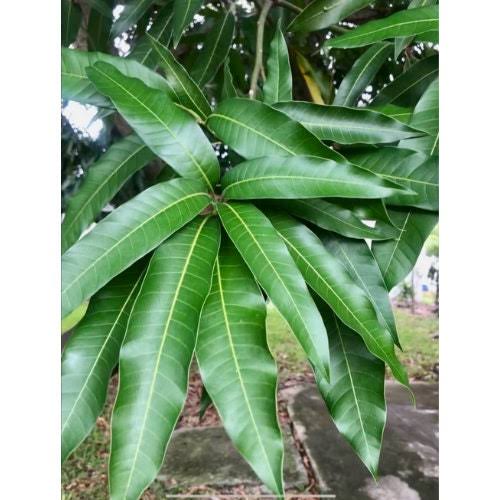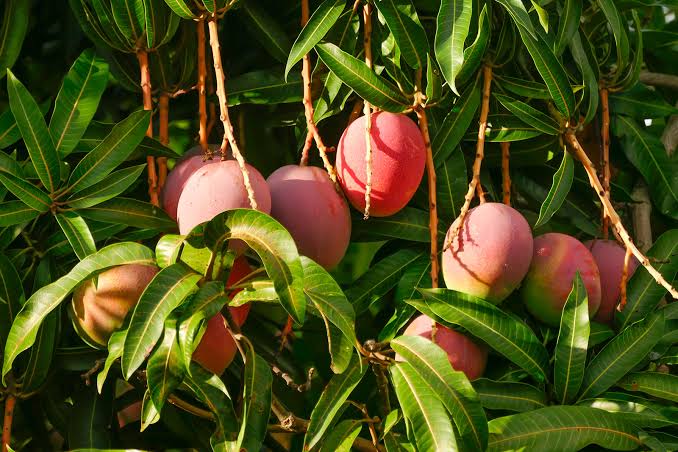Health & Fitness
8 Health Benefits of Mango Leaves

Mango leaves, often overlooked, have been used in traditional medicine for centuries due to their remarkable healing properties. In this article, we will be looking at how mango leaves can promote your well-being in various ways. From managing diabetes to boosting immunity and promoting healthy digestion, mango leaves offer a treasure trove of natural goodness. So sit back, relax, and look into the health benefits of mango leaves.
What Are Mango Leaves?

Before we look into the health benefits, let’s familiarize ourselves with the leaves. Mango leaves, scientifically known as Mangifera indica, are the leaves of the mango tree. Native to South Asia, mango trees are now cultivated in tropical regions worldwide. While mango fruits are well-known for their sweet and juicy flavor, their leaves have long been used in traditional medicine systems like Ayurveda for their therapeutic properties.
These beautiful leaves are rich in various bioactive compounds, including polyphenols, flavonoids, and triterpenoids, which contribute to their impressive health benefits.
Health Benefits of Mango Leaves
1. Mango Leaves Manages Diabetes
One of the most remarkable health benefits of the leaves is their potential for managing diabetes. Research suggests that the leaves may help regulate blood sugar levels. The active compounds in mango leaves act as natural insulin enhancers, facilitating glucose uptake and utilization by cells. Consuming mango leaf extract or tea may help lower fasting blood sugar levels and improve insulin sensitivity.
2. Mango Leaves Boost Immunity And Fighting Infections
In today’s fast-paced world, maintaining a strong immune system is essential for overall well-being. Mango leaves can be a valuable ally in this quest. These leaves possess antimicrobial and antioxidant properties, which help fight infections and protect the body from harmful free radicals. Regular consumption of mango leaf tea or including the leaves in your diet may strengthen your immune system, reducing the risk of common illnesses such as colds, coughs, and flu.
READ MORE: How To Manage And Prevent Frequent Stooling
3. Mango Leaves Promotes Healthy Digestion
If you’re looking to improve your digestive health, the leaves can be an excellent natural remedy. The leaves contain enzymes that aid in the breakdown of proteins and improve digestion. They also possess gastroprotective properties, which help soothe the digestive tract and alleviate issues such as indigestion, bloating, and constipation. Enjoying mango leaf tea after meals or incorporating mango leaves into your diet can promote a healthy digestive system.
4. Mango Leaves Support Cardiovascular Health

Maintaining a healthy heart is vital for a long and fulfilling life. the leaves may contribute to cardiovascular health due to their high content of phenolic compounds, which possess antioxidant and anti-inflammatory properties.
These compounds help reduce oxidative stress, lower cholesterol levels, and prevent the formation of plaque in the arteries, thereby reducing the risk of heart disease. Adding mango leaves to your diet or consuming mango leaf extract regularly may have a positive impact on your cardiovascular health.
5. Anticancer Properties
Some studies suggest that mango leaves may possess anticancer properties and could potentially help inhibit the growth of certain types of cancer cells. The presence of bioactive compounds, such as polyphenols and flavonoids, in the leaves is believed to contribute to their potential anti-cancer effects.
However, it’s important to note that more research is required to understand the mechanisms involved and establish the efficacy of the leaves in cancer treatment or prevention.
READ MORE: Health Benefits Of Sleeping Naked Every Night
6. Analgesic and Anti-Inflammatory Effects
The leaves have been traditionally used in herbal medicine to alleviate pain and reduce inflammation. The presence of certain compounds in the leaves is believed to possess analgesic and anti-inflammatory properties. While these effects have been observed in some studies, further research is necessary to determine the extent of these benefits and their practical applications.
7. Respiratory Health

Mango leaves offer respiratory health benefits. Some traditional remedies utilize mango leaves to treat respiratory conditions such as asthma, bronchitis, and coughs. The leaves are believed to possess expectorant properties, helping to expel phlegm and clear the airways. However, more scientific research is needed to evaluate the efficacy and safety of the leaves for respiratory health.
8. Skin and Hair Health
Mango leaves are also associated with potential benefits for skin and hair. They are believed to have antioxidant properties that can help protect the skin from oxidative stress and promote a healthy complexion. the leaf extract is also often used in hair care products due to its potential to strengthen hair follicles and promote hair growth. However, scientific studies in these areas are limited, and more research is necessary to validate these claims.
Conclusion
The leaves are not only a beautiful addition to the mango tree but also offer a plethora of health benefits. Incorporating mango leaves into your daily routine, whether through tea or by including them in your diet, can unlock the incredible healing properties they possess.
So, next time you enjoy a delicious mango, don’t discard its leaves. Instead, harness their power to enhance your well-being. Remember, nature has provided us with a multitude of treasures, and the leaves are undoubtedly one of them. Embrace their potential and experience the positive impact they can have on your health.
Note: While mango leaves have shown promising health benefits, it is essential to consult with a healthcare professional before making any significant changes to your diet or using mango leaves for medicinal purposes. They should not be used as a substitute for medical advice or treatment.
Now that you’re armed with knowledge of the leaves and their health benefits, go ahead and explore the wonders of nature’s gift to your well-being. Unlock the potential of the leaves and embark on a journey toward a healthier and happier life.
FAQ
1. How can I use mango leaves for their health benefits?
There are a few ways you can incorporate the leaves into your routine to reap their health benefits. One common method is to make mango leaf tea by boiling a few leaves in water and allowing it to steep for 10–15 minutes. You can drink this tea every day.
Another way is to grind the dried leaves into a fine powder and add it to your smoothies, soups, or other dishes. You can also find mango leaf extract in the form of capsules or tinctures, which can be taken as per the recommended dosage.
2. Are there any precautions or side effects associated with mango leaves?
The leaves are generally safe for consumption and have been used for centuries without significant side effects. However, it’s important to note that individual sensitivities and allergies can vary. If you have a known allergy to mangoes, it’s advisable to avoid the leaves as well.
Pregnant or breastfeeding women should consult their healthcare provider before using mango leaves for medicinal purposes. As always, it’s best to consult with a healthcare professional if you have any specific concerns or questions.
3. Can mango leaves cure diabetes?
The leaves have been traditionally used to manage diabetes, but it’s important to note that they are not a cure for the condition. The active compounds in the leaves may help regulate blood sugar levels and improve insulin sensitivity, but they should be used as a complementary approach alongside proper medical care, a balanced diet, and regular exercise.
If you have diabetes, it’s crucial to work closely with your healthcare provider to develop a comprehensive management plan.
4. How long does it take to see the effects of mango leaves on health?
The effects of the leaves on health can vary from person to person. Some individuals may experience noticeable improvements relatively quickly, while others may require longer periods of consistent use to see results. It’s important to remember that natural remedies often work gradually, and patience is key.
For optimal results, it’s recommended to incorporate the leaves into your routine consistently and give them time to have a positive impact on your overall well-being.
5. Can mango leaves be used to treat other conditions besides the ones mentioned?
The leaves have shown potential for managing diabetes, boosting immunity, promoting healthy digestion, and supporting cardiovascular health, but further research is needed to fully understand their benefits for other conditions. Some studies suggest potential anticancer, analgesic, and anti-inflammatory properties, but more research is necessary to validate these claims.
It’s always best to rely on scientifically proven treatments for specific health conditions and consult with a healthcare professional for personalized advice.



















